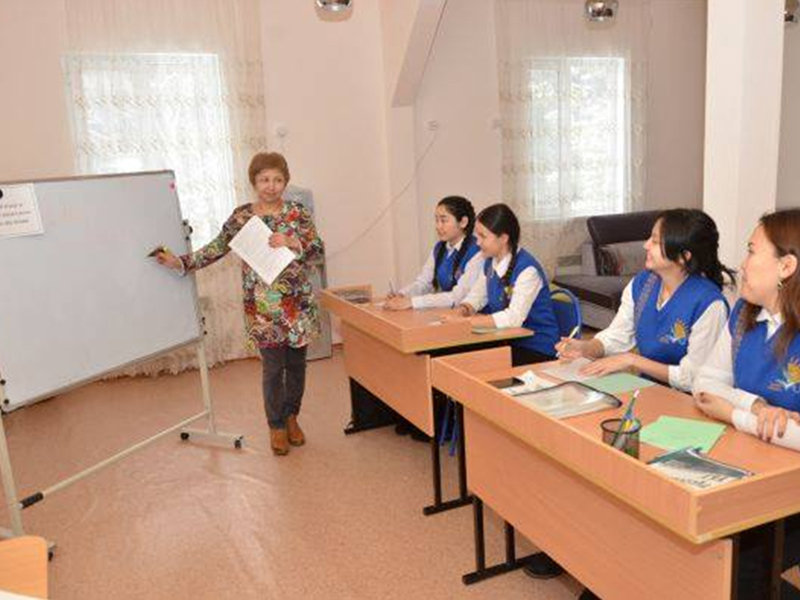The disciplines of the general education cycle "Kazakh language" and "Russian language" are assigned to the department, as well as the additional educational program Minor (Minor) "Language of professional communication" consisting of three modules: "Culture of professional Kazakh (Russian) speech", "Business communication in Kazakh (Russian) language”, “Language of science and technology”.
The main activities of the department:
- ensuring the quality of education and improving the language training of students in terms of the formation and development of their professionally oriented competence;
- search for new approaches to the organization of productive educational activities and the introduction into teaching practice of effective educational technologies that meet the requirements of the modern level of development of society;
- creation of psychological and pedagogical conditions for the cognitive and creative activity of students, the disclosure of their intellectual potential, the ability to self-educational activities;
- strengthening the role of the cultural component in teaching languages in the context of the dialogue of cultures for the implementation of intercultural communication and professional interaction.
Teachers of the department annually develop educational and methodological documentation (work programs and syllabuses, test material, examination material, guidelines for practical exercises, SRO and SROP). For the final control, level examination materials are developed that reflect the trends of modern language education.
The department has a large number of teaching aids of a new type. Surova D.S. published a teaching aid "Practical course of the Russian language"; a collection of creative tasks "Journalistic skills and speech behavior"; textbook "Scientific style of speech". Baibatanova F.I. in collaboration with a visiting teacher from the USA S. Korvin developed the English-Kazakh-Russian dictionary "Technical English". Bakieva A.K. issued manuals “Kasibi karym-katynas tіl madenieti”, “Kazakh tili. Oku kuraly". Adilbaeva Zh.D. teaches using the "Collection of texts with assignments in the Russian language (level A2)".
One of the important directions in the activity of the department is a methodical seminar. Supervises the methodological work of the department Art. teacher Erezhepova S.K. The seminars discuss topical aspects of language teaching methodology, summarize successful teaching experience; the results of mutual visits to classes, open classes are analyzed.
The department uses authentic audio and video materials, professionally oriented educational and information materials on the Internet, which create a favorable basis for the emergence of a sustainable cognitive interest in the study of the Kazakh and Russian languages. The online course "Russian Language B2" is hosted on the national platform of massive open online courses.
Teachers of the department master modern technologies and interactive teaching methods. So, Erezhepova S.K. passed advanced training at the FGB OUVO "State Institute of the Russian Language. A.S. Pushkin” under the additional professional program “Interactive and multimedia technologies in teaching Russian as a foreign language” (Moscow). Teachers of the department Adilbaeva Zh.D., Okasova B.K., Yesimzhanova G.T., Asavbayeva G.B., Erezhepova S.K., Adileva Kuzu A.T. completed a course under the program "Active Methods of Teaching the Russian Language" at the Center for Qualifications of the EKSU. S. Amanzholova (Ust-Kamenogorsk). Senior Lecturer of the Department Dronseika R.P. was trained at the National Open University "INTUIT" courses "Effective work of the teacher" and "Open educational resources". Surova D.S. studied under the program "English-Medium Instruction" from the University of Delaware (USA). Also, the staff of the department mastered the course "Methods of teaching Russian as a foreign language", which was organized by the South Ural State University (Russia).
Teachers of the department take part in international webinars, such as: “Trends in the career world for teachers: how, what and why is it important to teach children today?”, “Possibilities of eduScrum agile technology for the implementation of meta-subject and personal results of the Federal State Educational Standards”, “Master class: online tests as a replacement for paper tests”, “Secrets of successful teachers: how to earn more”, “Traditions and innovations in teaching the Russian language: the grammatical basis of a sentence”, etc.
Teachers of the department use interactive learning, project activities, video technologies, role-playing and business games, computer and multimedia teaching technologies.
The approaches used by the department to the organization of the educational process, focused on the personality of the student, productive learning activities and independent work, are an important condition for improving the language competence of students, a reserve for improving the training of specialists capable of professional interaction.
Practical classes are conducted using interactive methods: brainstorming, discussions, conversations, "Decision Tree", "Aquarium", "Pass the Problem", "Six Hats", etc. Teaching uses such methods as explanatory-illustrative, reproductive, problematic, partially search (or heuristic), research. Explanatory-illustrative, reproductive methods are associated with the assimilation of ready-made knowledge that is communicated by the teacher and then reproduced by students. The problematic method involves the active participation of students in solving the problem formulated by the teacher in the form of a cognitive task.
Date of last changes:01.02.2023










